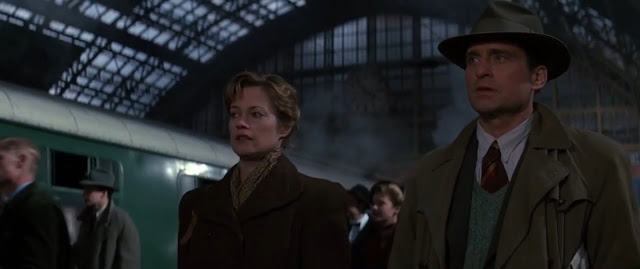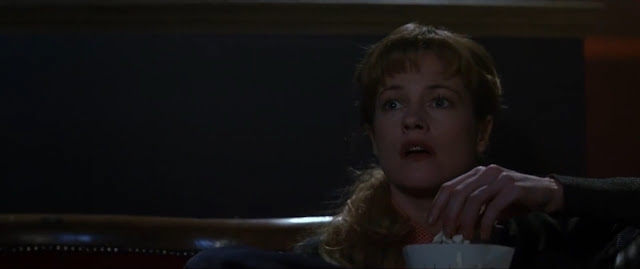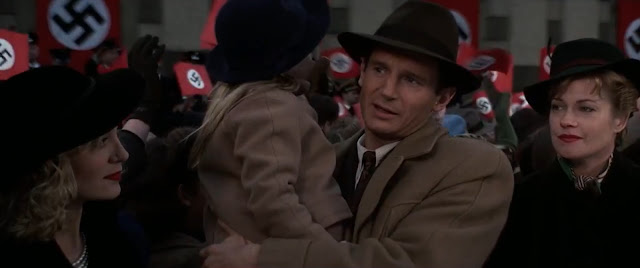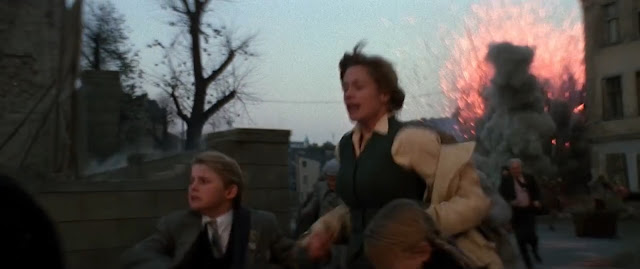 |
| An OSS agent (Michael Douglas) reluctantly sends his mistress (Melanie Griffith) behind enemy lines. |
Release Date: Jan. 31, 1992. Running Time: 132 minutes. Screenplay: David Seltzer. Based on the novel by: Susan Isaacs. Producer: Carol Baum, Sandy Gallin, Zvi Howard Rosenbaum, David Seltzer. Director: David Seltzer.
THE PLOT:
Linda Voss (Melanie Griffith) loves movies. She particularly loves the spy films that are so pervasive in New York in 1940: full of romance, intrigue, and heroics. She's watched so many that it doesn't take long for her to suspect that her boss, lawyer Ed Leland (Michael Douglas) is secretly a spy himself.
Amazingly, she's actually correct. Ed has been using his international connections to gather information about Germany for the OSS. When the US joins the war effort, he sheds his cover, going to work for the War Department. Linda eventually joins him as his secretary and translator.
Then an emergency strikes. An operative was gathering intelligence about a "flying bomb," but was murdered before he could provide detailed data. Linda volunteers - and given the short notice, her ability to speak German without an accent is enough to get her the job, despite Ed's reluctance.
Through a series of improbable coincidences, Linda ends up working as a nanny for the children of widower Franze-Otto Dietrich (Liam Neeson), a high-ranking Nazi official. It isn't long before she worries that Franze is suspicious of her. Ed wants her to leave immediately. But a new lead on the information pushes Linda to take a last, desperate chance...
 |
| Linda's spy training: watching too many movies. |
CHARACTERS:
Linda Voss: Probably the single biggest issue in this film is the casting of Melanie Griffith. It's not that Griffith can't play intelligent roles; she was terrific in Mike Nichols' Working Girl, for example. But she isn't an actress who innately conveys intelligence. Simply put, Linda does several massively stupid things over the course of the movie. That's a problem with the script - but Griffith doesn't have the screen persona to offset the stupidity. Both Debra Winger and Michelle Pfeiffer were considered for the role. Either of them would have likely been able to do more with the material.
Ed Leland: At least Griffith is putting in a sincere effort. Michael Douglas, who was at his career peak, was best known for delivering intensely energetic performances. In this movie, he sleepwalks through his scenes with the dazed look of an actor who signed on for one movie only to be stuck under contractual obligation when the script got changed. In his close-ups, I half expected him to start blinking a Morse Code plea for rescue. If nothing else, I think Douglas deserves the Sean Connery You Only Live Twice award for "actor who most looks like they'd rather be anywhere but here."
Gen. Dietrich: The Nazi officer with the secret plans... and, bizarrely, the most likable character in the movie. He's introduced at a dinner for the boorish Nazi official for whom Linda is acting as cook. After the underprepared Linda ends up serving the main course raw, Franze laughs about how the man ate every bite "just to prove it was edible." He is consistently shown to be good humored, is a concerned father, and is nothing but solicitous to Linda. A better movie might have done something with the idea of how the fanatical fervor of a movement like the Nazis can end up drawing in even otherwise nice and decent people. Shining Through, however, is not such a movie. Late in the film, we learn that other Nazis view Dietrich as "soft" and worry about his loyalties. Which begs the question: Why would they keep him in charge of such a vital project to begin with?
Margrete: Joely Richardson steals her every scene as a German socialite who also acts as an Allied spy. She bonds instantly with Linda, sharing her love of movies. One of her first questions is whether Clark Gable is really married to Vivien Leigh. When Linda bungles a simple message exchange, Margrete looks on with concern, but then laughs with Linda when they get out safely. Learning Linda is part Jewish, she insists on introducing her to her party-faithful mother, spitefully wanting to "watch her kiss a Jew."
"Sunflower": "and John Gielgud." By the 1990s, Gielgud could have had his name legally changed to "and John Gielgud" without it making any difference to his billing. Gielgud is always a welcome presence, even (sometimes especially) in bad films, but this script just doesn't give him anything to do. He appears just long enough to be grumpy at Melanie Griffith before handing her off to Joely Richardson, who basically acts as her handler for the rest of the movie. He reappears at the end to deliver a trailer-ready line about how Linda's bungling will "kill (them) all" - and that's about it. I think Caligula gave him a better role.
 |
| Joely Richardson as socialite/spy Margrete von Eberstein. Her performance is by far the best thing in this movie. |
"SAY SOMETHING NICE":
Shining Through was a major release, viewed by the studio as a prestige project, and the production values reflect this. This is a well-made movie, with plenty of professional polish. While I don't think the two leads work, the supporting performances of Joely Richardson and Liam Neeson are quite good. Richardson, in particular, seems to recognize the "classic Hollywood" vibe director David Seltzer's film is going for, helping to make her scenes easily the most enjoyable in the film.
"SO, WHAT WERE THEY ON?":
There's a bizarre ten minute deviation roughly a quarter of the way in. After America enters the war, Ed and Linda fly off to Washington... whereupon Ed leaves her and she goes to work at a stenographers' pool. She meets him again at a dance, only he's with another woman. This prompts her to have a public meltdown, after which she's working as his secretary again.
Everything is wrong with this collection of scenes. We are given no sense of how much time has passed. Weeks? Months? A year? There's nothing to tip us off. One moment doesn't really lead into the next, and I half wonder if a bunch of surrounding footage didn't hit the cutting room floor. Linda's meltdown is awful: badly written and poorly performed by both Griffith and Douglas.
Worst of all, the entire deviation serves no purpose. Linda gains no information that is used later in the film. Even Douglas's code name ("Trooper") is never mentioned again. Had they cut straight from the two flying out together to her working as his secretary in Washington, no one would know anything was missing - and in fact, the fim's progression would be less choppy and would make more sense!
 |
| Linda attends a rally with her Nazi employer (Liam Neeson), who is a good father and an all-around decent guy. |
OTHER MUSINGS:
So this World War II movie sees Michael Douglas sending his clingy mistress on a dangerous mission behind enemy lines. Given how often Douglas has played villains, I can't be the only one who thinks the whole movie would make more sense if this was actually an elaborate plot to get rid of her.
Shining Through opens well. The first half hour, with Linda realizing that Ed is a spy and initiating an affair with him, is reasonably engaging. There's a good scene in which Griffith realizes that a translator is giving Ed false information. She says nothing and quietly lets Ed know after the meeting. When she asks what he's going to do with the traitor, Ed replies simply: "Not use him as a translator anymore."
Unfortunately, the film gets steadily worse as it goes. I've already mentioned the ten minute deviation the film takes where Linda goes from being Ed's secretary, to not being his secretary, to being his secretary again. Well, odd plot progression isn't limited to that.
Here's the plan: Linda is to be placed in the home of Horst Drescher (Ronald Nitxchke), a boorish idiot, in hopes that he will somehow know something of the flying bomb. Linda gets fired, only to be picked up by Liam Neeson's Franze, who just happens to be at the disastrous dinner and just happens to be in charge of the project and just happens to need a nanny for his children. That's a lot of "just happens" when a tidier script could have had Margrete and Sunflower plant her with Franze in the first place!
Script problems are compounded by David Seltzer's direction. Seltzer directs like he's making the world's most expensive TV Movie of the Week. Scenes between Michael Douglas and Melanie Griffith often just cut between close-ups of one and then the other, effectively separating them during the scenes that are meant to sell the relationship between them.
The spy plot badly suffers from the limp direction. Think of Linda's actual situation: She's a half-Jewish American in a Nazi household, acting as a spy. If she's caught, then summary execution is one of her least bad possible outcomes. Despite this, there's no sense of actual tension or danger.
In the final Act, with Linda having missed her last deadline and having barely avoided being caught photographing plans, the film... takes time for an extended scene at the opera. The scene is plot important (mainly because Linda tells a very stupid lie at a very stupid moment), but it's allowed to run for far too long. Had it led to some kind of set piece/escape at the opera house - which, in story terms, it may as well have - then it might have worked. Instead, Linda and Franze go back to his home and exchange a few awkward words before the plot finally lurches forward again.
 |
| Linda gets caught in an Allied air raid! |
THE OTHER NOMINEES:
Newsies, Disney's musical dramam about the 1899 newsboys strike, was a critical and commercial flop, which is probably how it ended up with its Razzie nomination. Time has been kind to Newsies, however, and from a modern standpoint it being labeled one of the worst of the year seems like a headscratcher.
The Bodyguard, with Kevin Costner and Whitney Houston, was critically derided but financially successful. I'll split the difference; it's overlong and a bit slack, but it's still a serviceable romantic thriller. By contrast, Final Analysis, casting Richard Gere as a psychiatrist who starts an affair with Kim Basinger, is pretty dreadful - though at least it moves along and seems aware of its own ridiculousness, which makes it preferable to Shining Through.
Finally, there's Christopher Columbus - The Discovery, a laughable melodrama that would have been widely mocked even had it not come out so close to Ridley Scott's 1492 (which had its own problems, but was at least better than The Discovery). This probably was the actual worst picture of the nominees... but it's so bad that it's occasionally funny, particularly during Marlon Brando's cameo. By contrast, Shining Through is not only bad, but boring as well.
OVERALL:
Shining Through is a romantic thriller - except the romance falls completely flat, while the thriller plot lacks both tension and momentum. The heroine is stupid; the hero is dull; and the most likable character is the Nazi general!
Yeah, this one's pretty darn bad. It's not even bad enough to be funny. It's just... boring.
Rating: Turkey.
Worst Picture - 1991: Hudson Hawk
Worst Picture - 1993: Indecent Proposal
Review Index
To receive new review updates, follow me:
On BlueSky:
On Threads:


No comments:
Post a Comment